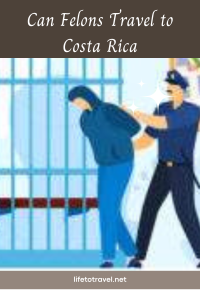Can Felons Travel to Costa Rica?
Are you a felon dreaming of visiting the lush rainforests, pristine beaches, and vibrant culture of Costa Rica? You may be wondering if your past conviction will hinder your travel plans. In this article, we will explore the question: Can felons travel to Costa Rica? Let’s delve into the travel restrictions, potential challenges, and opportunities available for individuals with a criminal record.
Understanding Travel Restrictions:
While each country has its own entry requirements and regulations, Costa Rica does not explicitly ban felons from visiting. However, the country does conduct routine security checks upon arrival, which may include screening for criminal records. It’s important to note that any individual with an active arrest warrant or pending charges may be denied entry or detained.
Challenges Faced by Felons:
While Costa Rica does not have a formal policy prohibiting felons from entering the country, individuals with criminal records may encounter challenges during the travel process. The main concerns revolve around immigration officers exercising discretion, potentially denying entry based on a person’s criminal history.
Moreover, certain crimes such as drug trafficking, human trafficking, or offenses against children may increase the likelihood of being denied entry or facing closer scrutiny. Each case is evaluated individually, and decisions are made based on the perceived risk to national security and public safety.
Opportunities and Strategies:
Despite the potential challenges, felons can take certain steps to increase their chances of a successful trip to Costa Rica. Here are some strategies to consider:
- Research Entry Requirements: Before planning your trip, thoroughly research the entry requirements and regulations imposed by Costa Rica. Familiarize yourself with the specific documents needed, such as a valid passport, return ticket, and proof of sufficient funds for your stay.
- Legal Consultation: If you have concerns about your eligibility for travel due to your criminal record, consider seeking legal advice. An attorney specializing in immigration law can provide guidance on how to present your case effectively and increase your chances of a favorable outcome.
- Obtaining a Visa: While Costa Rica does not typically require a visa for short-term visits, certain individuals with a criminal record might benefit from obtaining a visa in advance. A visa can provide an opportunity to present your case and demonstrate your intent to visit Costa Rica for legitimate reasons.
- Rehabilitation and Character References: Highlight any efforts you have made towards rehabilitation and personal growth since your conviction. Character references from employers, community leaders, or professionals who can vouch for your credibility and positive contributions may help strengthen your case.
- Honesty and Transparency: When dealing with immigration officers, honesty is key. Be prepared to provide accurate and truthful information regarding your criminal history if asked. Attempting to conceal or misrepresent your past can lead to severe consequences, including being barred from entering the country.
Conclusion:
While traveling to Costa Rica as a felon may present challenges, it is not an outright impossibility. By understanding the travel restrictions, being prepared, and adopting the right approach, you can increase your chances of a successful trip. Remember to conduct thorough research, seek legal advice if necessary, and present yourself honestly and transparently. With careful planning and perseverance, you can make your dream of experiencing the wonders of Costa Rica a reality.

